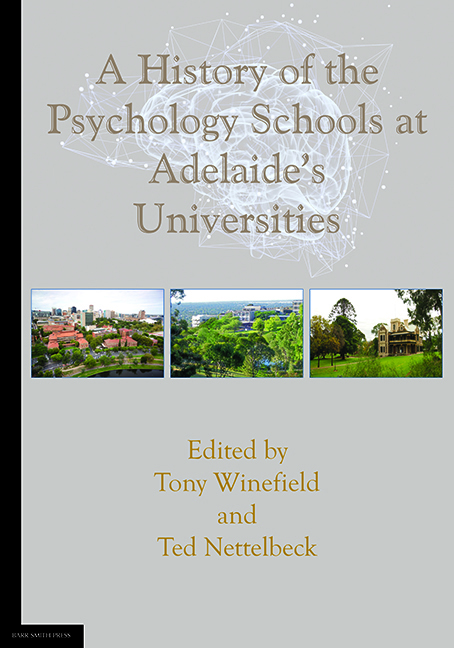Book contents
- Frontmatter
- Contents
- List of contributors
- Preface
- 1 Introduction
- 2 The origins and early history of the University of Adelaide's School of Psychology
- 3 The later years
- 4 Teaching applied psychology at the University of Adelaide: A personal view
- 5 Flinders University: Psychology in the twentieth century
- 6 Recent history of Flinders School of Psychology
- 7 The history of Psychology at the University of South Australia: From little things big things grow
- 8 The history of Psychology at the University of South Australia: Recent history
3 - The later years
Published online by Cambridge University Press: 25 July 2017
- Frontmatter
- Contents
- List of contributors
- Preface
- 1 Introduction
- 2 The origins and early history of the University of Adelaide's School of Psychology
- 3 The later years
- 4 Teaching applied psychology at the University of Adelaide: A personal view
- 5 Flinders University: Psychology in the twentieth century
- 6 Recent history of Flinders School of Psychology
- 7 The history of Psychology at the University of South Australia: From little things big things grow
- 8 The history of Psychology at the University of South Australia: Recent history
Summary
2000 and beyond
John Eaton Taplin was the first external appointment to the position of chair of psychology at the University of Adelaide and head of the department since Alan Welford's appointment in 1969 as successor to Malcolm Jeeves. He was a graduate of the University of Adelaide (he had completed the BSc Honours degree in 1967, supervised by Ken Provins, and he had a PhD conferred in 1972, supervised first by Malcolm Jeeves, but followed by Don McNicol and Ian John when Jeeves moved to St Andrews). Moreover, he had earlier held temporary appointments in the department as technical and professional officer and as a tutor while enrolled in the PhD degree, supervised by Professor Jeeves. Beyond the award of his PhD, he had gone on to complete postdoctoral studies at the University of Colorado in the US and taken up an assistant professorship at Claremont Graduate University in California, before returning in 1974 to the University of New South Wales, where he joined the academic staff in the school led by Professor Syd Lovibond, who had moved from the Adelaide department in 1969. Lovibond was committed to building a strong research-active school that would advance the evidence-based professional practice of psychology, and John Taplin's early career profile provided a good fit with these aims.
Taplin's move back to Adelaide from the beginning of 2000 marked a new phase for the department, which for some twenty years had functioned under a policy of governance by departmental committee convened by an elected chairperson, introduced by the university in 1974. His appointment was welcomed by current staff because he was seen as well qualified to lead the department at a time when the university was increasing expectations that all academic staff should be research-active. He had been a member of the editorial board of the prestigious Journal of Experimental Psychology: Human Learning and Memory and during his twenty-five years at the University of New South Wales had built an international reputation as a scholar and researcher.
- Type
- Chapter
- Information
- Publisher: The University of Adelaide PressPrint publication year: 2016



